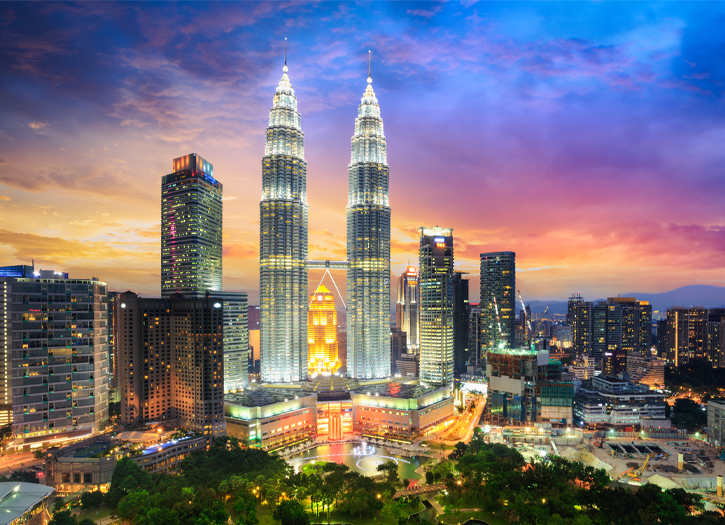Reported cases remained relatively low at first and were largely confined to imported cases, until localised clusters began to emerge in March; the largest cluster was linked to a Tablighi Jamaat religious gathering held in Sri Petaling, Kuala Lumpur in late February and early March, leading to massive spikes in local cases and an exportation of cases to neighbouring countries. Within a few weeks, Malaysia had recorded the largest cumulative number of confirmed COVID-19. By 16 March, the virus was reported in every state and federal territory in the country.
Initially reporting the highest number of cases in Southeast Asia in March and early-April, daily active cases in Malaysia have declined steadily from a peak of 2,596 in early April to a fluctuation of less than 250 cases by late June. Malaysia reported its first three cases on 25 January 2020, all of whom were Chinese nationals who had visited the country. By 30 January, the number of cases had risen to eight. In response, the Ministry of Health published guidelines on the virus and established designated hospitals in all of Malaysia’s states and federal territories to manage any positive cases. In response to the rise in cases nationally, Prime Minister Muhyiddin Yassin announced that Malaysia would enter into lockdown on 18 March 2020. On 17 March, Malaysia reported its first two deaths from the coronavirus: a 60-year-old priest from Emmanuel Baptist Church in Kuching, Sarawak and a 34-year-old participant of the Muslim religious gathering in Sri Petaling from Johor Bahru, Johor.
The Ministry of Education of Malaysia announces that all extracurricular activity in schools will be suspended starting from March 2020 until further notice.On 15 April, the Education Minister Mohd Radzi Md Jidin announced that the Ujian Penilaian Sekolah Rendah (UPSR) and Pentaksiran Tingkatan Tiga (PT3) examinations for standard six and form three students have been cancelled for 2020 in light of the COVID-19 pandemic. He also announced that all other major school examinations including the Sijil Pelajaran Malaysia (SPM) and Sijil Tinggi Persekolahan Malaysia (STPM) would be postponed to 2021 and August 2020 respectively.
On 23 June, the Ministry of Education announced changes to school term holidays in order to help schools better plan lessons that had been disrupted by the COVID-19 pandemic and Movement Control Order. The mid-term break would be reduced from nine days to five days. The end of the year break in schools in Group A states (Johor, Kedah, Kelantan, and Terengganu) would be reduced from 42 days to 14 days.The Education Ministry confirmed that the school year for 2020 will now total 168 days. In response, former Education Minister Maszlee Malik criticised the Ministry for not consulting with teachers and teachers’ unions including the National Union of the Teaching Profession.
On 3 June, Education Minister Dr Mohd Radzi Md Jidin announced that the Government would be distributing guidelines for reopening schools to teachers on 4 June as part of efforts to reopen the education sector.On 6 June, Director-General of Health Noor Hisham Abdullah announced that hair and beauty salons will be able to reopen on 10 June.On 10 June, Education Minister Mohd Radzi Md Jidin confirmed that schools in the country would begin reopening in stages from 24 June, with priority being given to students taking secondary and equivalent international leaving exams.As part of social distancing measures, schools will serve pre-packaged food and all students will have their temperatures checked when entering schools.
On 26 June, Senior Minister Ismail Sabri Yaakob announced that tuition centres, special education schools and private schools would be allowed to operate soon.On 29 June, it was reported that both public and private pre-schools, kindergartens, nurseries and day care centres would resume operations from 1 July. In addition, several businesses have been allowed to reopen including spas, wellness and foot massage centres, cinemas, theatres and “live” event venues. The Government has also allowed a range of social functions including meetings, conferences, seminars, course, training sessions, weddings, engagement parties, anniversary, birthday celebrations, and religious gatherings to be held. On 14 July, Senior Minister Ismail Sabri Yaakob announced that driving schools would be allowed to resume their courses.







Add Comment